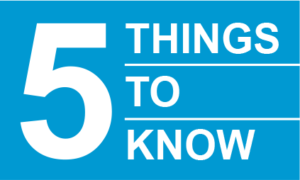MEDI-CAL MANAGED CARE PLAN TRANSITION: The Department of Health Care Services (DHCS) has released an All Plan Letter that provides guidance to all Medi-Cal managed care health plans (MCPs) regarding the 2024 MCP Transition, which is effective Jan. 1, 2024. In addition, DHCS has developed the 2024 Managed Care Plan Transition Policy Guide, which establishes and details the requirements for the implementation of the 2024 MCP Transition. The Policy Guide was initially published in May 2023 and will continue to be updated throughout 2023. All updates will be specifically identified in a dedicated section in the Policy Guide and will outline updates from prior versions in order to manage version history. The Policy Guide, which is also available on the DHCS 2024 MCP Transition web page, will denote effective dates and end dates, if applicable, to the specific policies contained therein.
INFORMATION NEEDED: CHA’s Trina Gonzalez recently sent an email to COOs and CFOs asking for assistance in providing contact information — by July 14 — to the California Department of Health Care Access and Information (HCAI) in response to Assembly Bill 1020. This bill was enacted in 2021 and made changes to California’s health care debt and fair billing laws. Beginning Jan. 1, 2024, the responsibility to enforce these laws will move from the California Department of Public Health to HCAI. To ensure that the appropriate staff with your system or facility receives communications from HCAI about the compliance requirements of the Hospital Fair Billing Program, HCAI is requesting information from hospitals. Specifically, HCAI is requesting that the following information be emailed to hfbp@hcai.ca.gov:
- Name of facility
- Address of facility
- License number
- Whether the facility is the primary license holder (parent hospital), distinct part, or consolidated part. If the facility is not the parent hospital (distinct part or consolidated part), does it use the same discount payment, charity care, and/or debt collection as the parent hospital, or will it submit policies separately?
- Secondary contact for hospital policy submission (name and email)
- Primary contact for the patient complaint process (name and email), if different from the primary contact for hospital policy submission
Please note that if the contact(s) provided applies to multiple facilities, systems should provide HCAI with the name, address, license number, and facility type (parent, consolidated, distinct part) for each facility to which the contact applies.
NATIONAL MINORITY MENTAL HEALTH AWARENESS MONTH: This month is observed each July to bring awareness to the unique struggles that racial and ethnic minority communities face regarding mental illness in the United States. The U.S. Department of Health and Human Services Office of Minority Health has developed several resources for health care providers and professionals:
- E-Learning Program: Improving Cultural Competency for Behavioral Health Professionals
- Guide: Behavioral Health Implementation Guide for the National Standards for Culturally and Linguistically Appropriate Services in Health and Health Care
- Webinar: Advancing Behavioral Health Equity: National CLAS Standards in Action
- Webinar: Trauma and COVID-19: Addressing Mental Health Among Racial/Ethnic Minority Populations
AVIAN FLU: In response to the global outbreak in birds of highly pathogenic avian influenza (HPAI) A(H5N1), the Centers for Disease Control and Prevention and the California Department of Public Health (CDPH) are encouraging providers to remain vigilant and to test for influenza this summer among persons with severe respiratory illnesses or who are exposed to poultry and swine. In a recent Health Update, CDPH requests that health care providers immediately report HPAI A(H5N1) infections to their local health department.
COUNTY BUDGET: Last week, the San Diego County Board of Supervisors unanimously adopted its new $8.17 billion budget for fiscal year 2023-24. The adopted budget shows an increase of $806.4 million or 11% from last year. Among the investments in the budget are:
Mental Health and Substance Use Disorder
- $66.7 million increase for a total investment of $737.9 million for contracted services
- $18.3 million for implementation of the CARE Act
- $7.1 million to address opioid addiction
Homelessness and Housing
- $25 million increase for the Innovative Housing Trust Fund to help build affordable housing
- $6.6 million increase to support Permanent Local Housing Allocation and HUD entitlement programs
- $5.8 million increase to prevent homelessness and provide housing stability for families experiencing homelessness
- $2.3 million for homeless services/housing for the LGBTQIA+ community
- $2 million increase to expand the Pilot Shallow Rental Subsidy Program
- $2 million increase for the Alternatives to Incarceration initiative to provide care coordination and housing for high-needs justice-involved populations assisted through the Connection Points pilot
- $0.5 million increase to expand regional homeless diversion efforts
